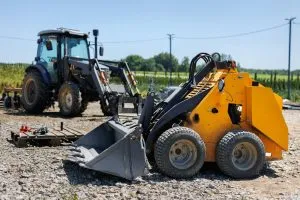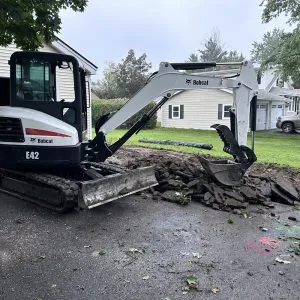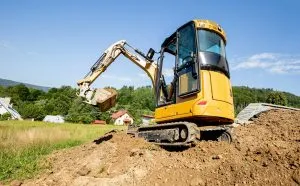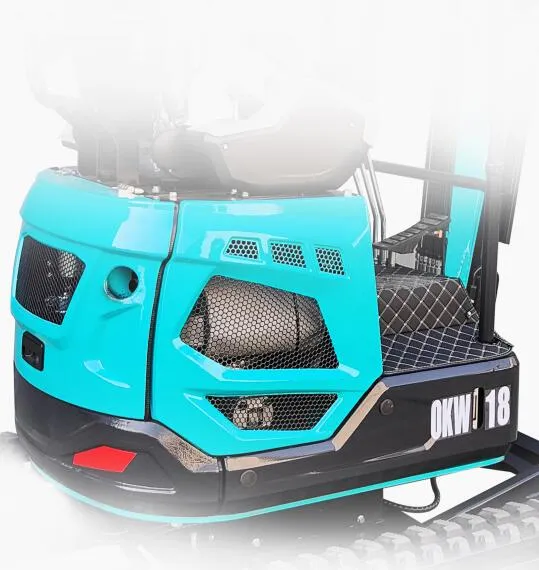Compact excavators, also known as mini excavators, are versatile pieces of construction equipment that have become indispensable in a wide range of industries. Their small size, maneuverability, and power make them ideal for tasks that larger machines cannot efficiently handle. Whether in construction, landscaping, or utility work, compact excavators offer precision and functionality in tight spaces. In this article, we will explore the top 10 common applications of a compact excavator, showcasing their broad utility across different sectors.
1. Residential and Commercial Construction Projects
One of the most common applications of compact excavators is in residential and commercial construction. These machines are perfect for small to medium-sized projects that require excavation in confined spaces. From digging foundations for homes to creating trenches for utility installations, compact excavators are highly efficient in these environments. Their ability to maneuver in tight spaces, such as between buildings or along narrow streets, gives them a clear advantage over larger, bulkier machines.
Use cases in construction include:
- Excavating foundations for houses and commercial buildings.
- Preparing ground for driveways, walkways, and patios.
- Digging out basements and crawl spaces.
- Laying drainage systems and sewer lines.

2. Landscaping Projects
Landscapers frequently turn to compact excavators for their various landscaping projects. The small footprint and precise digging capabilities of these machines allow for detailed work in residential yards and commercial green spaces. Tasks like tree planting, stump removal, and digging for irrigation systems are made easier with the use of compact excavators.
Landscaping applications:
- Digging holes for tree and shrub planting.
- Creating trenches for irrigation systems.
- Removing old tree stumps or shrubs.
- Leveling uneven terrain.
- Constructing garden ponds or water features.
3. Demolition Work
Compact excavators are also highly effective in light demolition work. In situations where delicate or precise work is required, a compact excavator provides the necessary control and precision. They are commonly used for demolishing small buildings, sheds, fences, and even removing interior structures within buildings. The ability to attach different tools, such as hydraulic hammers or grapples, further enhances their demolition capabilities.
Demolition applications:
- Tearing down small buildings or structures.
- Breaking up concrete or asphalt surfaces.
- Removing interior walls or fixtures in renovations.
- Demolishing decks, fences, and other outdoor structures.

4. Utility and Infrastructure Work
In utility and infrastructure projects, compact excavators play a crucial role. These machines are often used for installing or repairing underground utilities, such as water, gas, and electrical lines. Their compact size allows them to work efficiently in urban environments where space is limited, while their precision digging helps minimize disruption to the surrounding area.
Utility applications:
- Digging trenches for underground utility lines.
- Installing sewer systems and drainage pipes.
- Repairing water and gas mains.
- Excavating for electrical conduit installation.
- Laying fiber-optic cables for telecommunications infrastructure.
5. Agricultural Applications
Farms and agricultural operations benefit greatly from the use of compact excavators. These machines are ideal for performing tasks that would otherwise require extensive manual labor or larger, less precise equipment. Compact excavators are frequently used for digging irrigation channels, maintaining drainage systems, and removing rocks or tree stumps from fields.
Agricultural uses:
- Digging irrigation ditches or trenches.
- Installing or maintaining drainage systems.
- Removing rocks and stumps from fields.
- Excavating ponds for livestock or water storage.
- Digging fence post holes for fencing projects.

6. Road and Path Construction
Compact excavators are regularly utilized in road and path construction, especially for smaller-scale projects such as walkways, bike paths, and driveways. Their ability to precisely dig and move materials makes them well-suited for this type of work. In addition, compact excavators are often used for repairing and maintaining existing roads, particularly when dealing with damaged asphalt or laying new surfaces in restricted spaces.
Applications in road construction:
- Excavating foundations for roads, paths, and driveways.
- Laying pipes and drainage systems beneath roads.
- Removing damaged asphalt or concrete.
- Backfilling trenches after utility installation.
- Smoothing and grading surfaces for path construction.
7. Snow Removal
In regions with harsh winters, compact excavators have found an essential role in snow removal. These machines can clear snow in areas that are difficult for larger snowplows to access, such as narrow streets, driveways, and sidewalks. With the appropriate attachments, such as snow blades or snow blowers, compact excavators offer a versatile solution to managing heavy snowfalls.
Snow removal tasks:
- Clearing snow from driveways, sidewalks, and parking lots.
- Removing snow from building roofs.
- Creating pathways for pedestrians during heavy snowstorms.
- Breaking up ice or hard-packed snow.
- Relocating snow piles to reduce obstruction.
8. Site Preparation for Pools and Water Features
When constructing pools or other water features, compact excavators are essential for site preparation. These machines allow contractors to carefully dig out the required area for the pool or pond while minimizing damage to the surrounding landscape. Their precision is crucial for ensuring that the pool is level and that the required depth is reached.
Applications in pool and water feature construction:
- Excavating the site for pools and garden ponds.
- Creating trenches for pool plumbing and drainage systems.
- Leveling the ground around the pool or water feature.
- Backfilling around pool installations.
- Digging for hot tub or spa installations.
9. Forestry and Land Clearing
In forestry operations, compact excavators are used for land clearing and maintenance tasks. These machines can be equipped with specialized attachments, such as mulchers or grapples, to handle brush, logs, and small trees. Their compact size makes them particularly useful in dense forest areas where access is limited, allowing for efficient clearing and maintenance of forest roads or firebreaks.
Forestry and land clearing uses:
- Removing trees, brush, and stumps.
- Creating and maintaining firebreaks.
- Clearing land for logging or farming.
- Maintaining forest access roads.
- Excavating for forest management projects, such as fire pits or drainage ditches.

10. Mining and Quarrying
Compact excavators have a role in small-scale mining and quarrying operations. Their versatility and ability to operate in confined spaces make them ideal for accessing narrow tunnels or working on the surfaces of quarries. Compact excavators can be used to dig trenches, remove overburden, and assist in extracting minerals or other resources from the earth.
Mining and quarrying tasks:
- Excavating material from small quarry operations.
- Clearing overburden and debris.
- Digging trenches for drainage or utility installation in mining sites.
- Assisting in the extraction of minerals from the ground.
- Transporting materials within confined spaces of the mine or quarry.
Conclusion
Compact excavators have proven themselves to be highly versatile machines that are capable of handling a wide range of tasks across various industries. From residential construction to large-scale utility projects, these machines are essential tools that offer efficiency, precision, and flexibility. Their compact size allows them to work in areas where larger machines cannot, making them an invaluable asset in both urban and rural settings.
With their adaptability and extensive range of attachments, compact excavators continue to expand their presence in industries like construction, landscaping, utility work, and agriculture. Their ability to perform tasks that require precision and agility ensures that compact excavators will remain a critical piece of equipment for contractors and operators around the world.
Whether you’re building a backyard pool, installing a sewer line, or clearing snow from your driveway, a compact excavator is up to the task. These machines represent the perfect combination of power and efficiency, allowing operators to accomplish more in less time and with greater accuracy.

Frequently Asked Questions (FAQs)
1. What is the difference between a compact excavator and a standard excavator? A compact excavator, also known as a mini excavator, is smaller and lighter than a standard excavator. It is designed for work in tighter spaces and is more maneuverable, making it ideal for smaller-scale projects.
2. Can compact excavators be used for large construction projects? While compact excavators are more suited to small and medium-sized projects, they can still play a significant role in large construction projects, particularly in areas where precision digging or access to confined spaces is required.
3. What attachments can be used with compact excavators? Compact excavators are highly versatile thanks to the wide range of attachments available, including buckets, hydraulic hammers, augers, grapples, rippers, and mulchers.
4. How deep can a compact excavator dig? The digging depth of a compact excavator depends on the model, but typically, they can dig between 6 and 14 feet deep, making them suitable for most small to medium excavation tasks.
5. Are compact excavators easy to operate? Yes, compact excavators are generally user-friendly and designed for ease of operation. Most models feature simple controls, and many come equipped with advanced features like joystick control for precision movement.
6. Can a compact excavator be used for demolition work? Yes, compact excavators can be equipped with specialized attachments like hydraulic hammers or grapples, making them suitable for light to medium demolition work.






